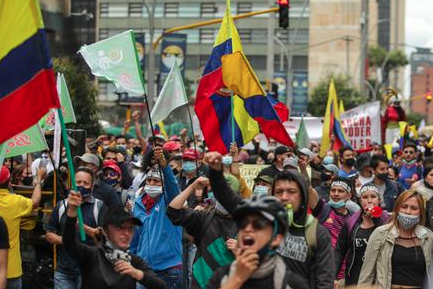
May 7, 2021 | News
The Colombian Commission of Jurists (CCJ) and the ICJ have called upon national and local authorities to respect the right of peaceful assembly and cease all use of unlawful force against protestors immediately.
Beginning 28 April, thousands of people have taken to the streets in towns and cities throughout Colombia to protest and the social and economic policies of the current national government. As of this writing the protests continue.
The CCJ and the ICJ have expressed their concern about widespread and serious human rights violations committed during the protests.
There are multiples reports from civil society organizations that document incidents where police officials have opened fire with live ammunition against protestors.
Although full and precise figures are unavailable, as of 6 May 2021, according to the Ombudspersons’ Office at least 26 people had lost their lives. In at least 11 cases, police officials were allegedly responsible for the killings.
The NGO Temblores has documented 37 killings and the NGO Indepaz has information of more than 1.200 people injured during the protests. In addition, a number of cases of sexual violence have been reported.
The organizations are especially concerned that there are substantial number of people whose whereabouts are unknown. Complete figures on possible disappeared persons are not available. Even more worrisome, there are substantial differences among the figures provided by different sources.
In this regard, for instance, the Ombudspersons’ Office said that it has received information about the possible disappearance of 145 people. The Ombudspersons’ Office has established the whereabout of 55 people.
For its part, the civil society platform Mesa de Trabajo sobre Desaparición Forzada en Colombia has informed that it has information of 471 potential cases of enforced disappearances. According to the platform, the whereabout of 92 people have been determined.
The violent acts committed in Valle del Cauca are particularly serious. In this region, it has been reported that at least 17 people have died, and an undetermined number of people are seriously wounded.
Similarly, in Cali, some members of human rights organizations and the Office of the United Nations High Commissioner for Human Rights in Colombia alleged that they had been subject to verbal attacks and physical assault when there were verifying the situation of detained people.
The CCJ and the ICJ urge Colombian authorities to acknowledge act to address the allegations of human violations committed during the protests. They must conduct, independent, impartial, prompt, thorough, effective, and transparent investigations in accordance with Colombian law and its obligations under the International Covenant on Civil and Political Rights.
Furthermore, the investigation must take place within the ordinary criminal jurisdiction and under no circumstances should there be resort to military jurisdiction. Under international law and standards, cases that may constitute arbitrary deprivation of life or enforced disappearances cannot be considered to be connected with military duties.
Additionally, there is information that some police officials have been wounded, and at least one was allegedly unlawfully killed. The CCJ and the ICJ condemn these and other violent acts and urge judicial authorities to investigate and sanctions those responsible.
On the other hand, the CCJ and the ICJ recall that the use of force by police officials should must only be deployed in accordance with international standards. In particular, any such action must comply with the UN Basic Principles on the Use of Force and Firearms by Law Enforcement Officials.
These Principles establish that the use of force should be exceptional, necessary and proportional. Especially, authorities should faithfully comply with principle 9 that sets out that lethal force should be not used “except in self-defence or defence of others against the imminent threat of death or serious injury”.
Finally, the CCJ and the ICJ express their great concern about the national government’s decision to involve the military forces for the contention of the violence under the legal figure of “military assistance” (asistencia militar). The decision does not respect the international human rights law standards on the use of force and the right of peaceful assembly.
It should be remembered that military forces are not trained or designed to protect and control civilians during protests or scenarios of disruption of public order.
Therefore, the participation of military forces should be exceptional in situations of necessity, for example to confront immediate extreme violence and temporally limited, as affirmed by international bodies such as the UN Committee on Human rights and the Inter-American Court of Human Rights.
Contacts:
Ana María Rodríguez, Deputy Director of the Colombian Commission of Jurists, anarodriguez(a)coljuristas.org
Rocío Quintero M, Latin American Legal and Policy Adviser, International Commission of Jurists, rocio.quintero(a)icj.org
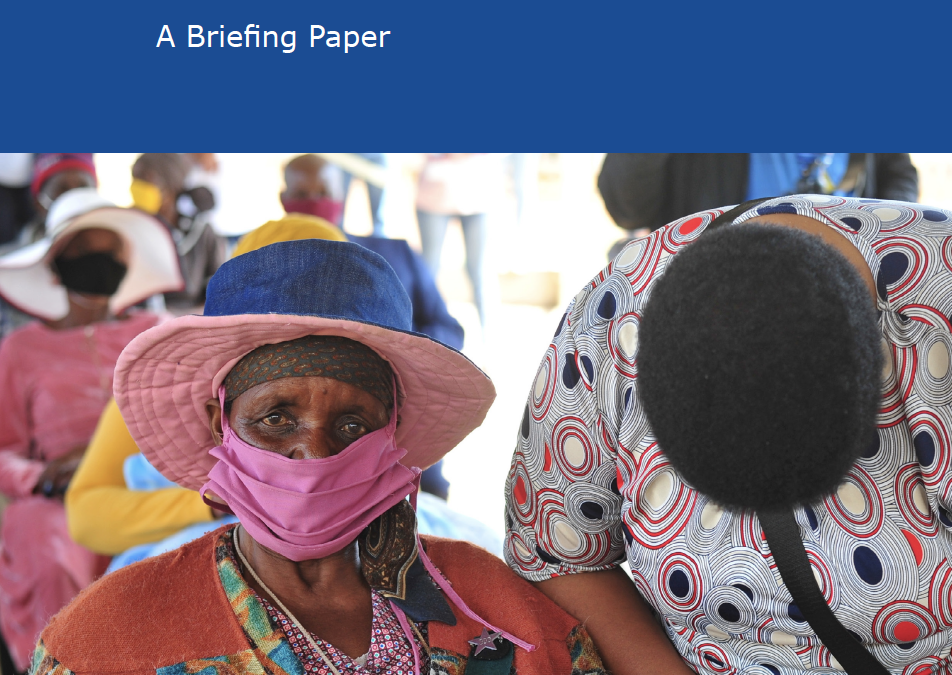
May 6, 2021 | News, Publications, Reports
Southern African States have individually and collectively failed to provide sufficient and equitable COVID-19 vaccine access to meet their human rights obligations, the ICJ said today in a new briefing paper entitled The Unvaccinated: Equality not Charity in Southern Africa.
The paper focuses on the impact of COVID-19 on countries of the Southern African Development Community (SADC), a regional economic community comprising 16 Southern African countries whose goal is to enhance the standard and quality of life of the peoples in the region.
The publication considers SADC and its Member States’ collective failure to ensure access to COVID-19 vaccines despite more than 63,000 lives lost to the virus and countless others’ lives and livelihoods affected in the region.
This is due to a multitude of reasons, some common amongst the countries and others unique to individual Member States. While Tanzania and Madagascar denied the existence of the virus and rejected COVID-19 vaccines respectively, other countries with relatively greater resources, such as South Africa, failed to mobilize their resources adequately and equitably.
“COVID-19 is a global pandemic, but its impact was aggravated in southern Africa by the failure of governments to prepare and respond, individually or through SADC,” said Tim Fish Hodgson, ICJ’s Legal adviser on Economic, Social and Cultural Rights, in Johannesburg.
Combatting deadly communicable diseases like COVID-19 is one of the founding objectives under SADC’s founding treaty, and is also accounted for under the SADC Health Protocol. Yet, SADC has failed to provide almost any concrete guidance or coordinating role in regional procurement of COVID-19 vaccines since October 2020, prior to the availability of COVID-19 vaccines. While SADC’s chair, President Filipe Nyusi of Mozambique has encouraged a regional pooling of resources to facilitate procurement of necessary vaccines and distribution in a statement in January 2021, SADC has since taken no clear action towards this goal.
“While powerful global actors have erected roadblocks to equitable vaccine access in southern Africa, this should not conceal the burning need for SADC States to take essential measures to mobilize their collective resources towards efficient and equitable vaccine acquisition, allocation and distribution. As our research shows, they have failed to do so and SADC has been conspicuously silent,” Hodgson said.
These dire circumstances have led Fatima Hassan, South African human rights defender and director of the Health Justice Initiative, to observe that “philanthropy [and] benevolence cannot fund equality” in vaccine access. Indeed, the donation of vaccine doses through COVAX and other measures are not enough, and without rapid and adequate action to ensure equitable access to COVID-19 vaccines, it might be too late.
The ICJ’s research at a global and regional level have emphasized the urgent need for international institutions like the World Trade Organization and wealthier States to help countries to manufacture or otherwise acquire and distribute vaccines at affordable prices unimpeded by rigid intellectual property rights restrictions.
“All States should urgently heed the proposal by South Africa and India before the WTO for a waiver of the TRIPS intellectual property rules to allow faster, wider, and better distribution of COVID-19 vaccines,” Hodgson said.
“It is encouraging to see the United States end their opposition to the TRIPS waiver, and we hope that other States, in the European Union, Switzerland, Norway, and Brazil, will end their opposition and recognize that until everyone is safe, no one is truly safe.”
The ICJ emphasized that efforts by SADC and Southern African States is essential alongside ramped up global action.
“The pandemic is raging around the world even though a few countries, mostly the wealthiest, are now able to look beyond the worst of it. Most countries in Southern Africa remain unvaccinated, and in fact we are looking at new devastating waves of the illness. SADC should immediately improve efforts at collaboration and coordination to ensure compliance with their human rights obligation to provide everyone in the region with vaccine access as soon as possible,” Hodgson added.
The ICJ makes recommendations to specific States including Malawi, Tanzania, Madagascar, Zimbabwe and South Africa as well as a range of general recommendations to the SADC, including:
- The SADC Secretariat should urgently and actively facilitate and advance sub-regional COVID-19 vaccine procurement and distribution between the Member States.
- The SADC Secretariat should provide clear guidance to Member States on their human rights obligations pertaining to vaccine access. They should take effective action to address the failure of Member States to act according to their obligations under international law, including under regional agreements.
- All SADC member States should, as a matter of priority, develop, publish and publicize national vaccine acquisition and rollout plans and procurement strategies, detailing concrete measures to ensure non-discriminatory access to vaccines to all people.
Contact
Timothy Fish Hodgson, Legal Adviser on Economic, Social and Cultural Rights, timothy.hodgson(a)icj.org
Tanveer Jeewa, Legal and Communications Officer, tanveer.jeewa(a)icj.org
Download
Africa-The Unvaccinated-Publications-Reports-2021-ENG (full report, in PDF)
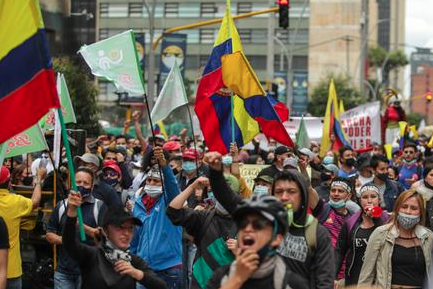
May 6, 2021 | Noticias
La Comisión Colombiana de Juristas (CCJ) y la CIJ solicitan a las autoridades nacionales y locales que respeten el derecho fundamental a la protesta y paren de manera inmediata las acciones violentas en contra de los manifestantes.
Desde el pasado 28 de abril de 2021, en varias ciudades y municipios, miles de personas han salido a las calles a protestar y manifestar su descontento por varias políticas sociales y económicas del actual gobierno. La CCJ y la CIJ expresan su preocupación por las graves violaciones a los derechos humanos cometidas en el marco de estas protestas.
Varios reportes de organizaciones de la sociedad civil muestran que miembros de la Policía han abierto fuego contra personas que estaban protestando. Aunque las autoridades no han entregado información precisa, la Defensoría del Pueblo informó el 5 de mayo que 24 personas habían muerto. En al menos 11 casos, el responsable sería la Policía Nacional. Por su parte, la ONG Temblores ha reportado que al menos 31 personas han sido asesinadas y la ONG Indepaz ha documentado que hay más de 1.200 personas heridas.
También resulta preocupante la cifra de personas cuyo paradero se desconoce. Al respecto, la Defensoría del Pueblo reportó haber recibido información de la desaparición de 89 personas en distintas ciudades como Bogotá, Medellín, Barranquilla y Cali, y varias organizaciones de derechos humanos tienen información de más casos de personas cuyo paradero se desconoce. Adicionalmente, se han denunciado casos de violencia sexual.
De particular gravedad resultan los hechos de violencia ocurridos en el Valle del Cauca, en donde al menos 17 personas han muerto y otras personas han sido gravemente heridas. Asimismo, en Cali, varias organizaciones de derechos humanos y personal de la Oficina de la Alta Comisionada para los Derechos Humanos denunciaron haber sido agredidos física y verbalmente cuando se encontraban verificando la situación de las personas detenidas.
La CCJ y la CIJ instan a las autoridades colombianas a reconocer los abusos y las violaciones de derechos humanos cometidas en el marco de las protestas, así como a llevar a cabo investigaciones independientes, imparciales, prontas, rigurosas, efectivas, creíbles y transparentes por los hechos que constituyen violaciones a los derechos humanos de acuerdo con las obligaciones internacionales del Estado consagradas en el Pacto Internacional de Derechos Civiles y Políticos.
Además, estas investigaciones deben ser adelantadas por la jurisdicción ordinaria y no por la jurisdicción penal militar. En ninguna circunstancia puede considerarse que posibles desapariciones forzadas o ejecuciones extrajudiciales o arbitrarias sean actos que guarden conexión con la disciplina o la misión castrense.
Igualmente, hay información acerca de que varios policías han sido heridos y que al menos uno ha fallecido. La CIJ y la CCJ rechazan estos y otros actos de violencia que han ocurrido e instan a las autoridades judiciales a investigar y sancionar estas conductas.
Por otro lado, la CCJ y la CIJ insisten en que el uso de la fuerza por parte de la policía debe ser acorde a los estándares internacionales. En particular, las autoridades deben respetar lo establecido en los “Principios Básicos sobre el Empleo de la Fuerza y de Armas de Fuego por los Funcionarios Encargados de Hacer Cumplir la Ley”, que determinan que el uso de la fuerza deber ser excepcional, necesario y proporcional.
Especialmente, las autoridades deben dar fiel cumplimiento al principio 9 que determina que la fuerza letal solo puede usarse “en defensa propia o de otras personas, en caso de peligro inminente de muerte o lesiones graves”.
Finalmente, la CCJ y la CIJ manifiestan su gran preocupación con la decisión del gobierno nacional de involucrar a las fuerzas militares en la contención de la violencia, a través de la figura de “asistencia militar”. Esta decisión desconoce los estándares internacionales que rigen el uso de la fuerza y el derecho a la protesta.
Debe recordarse que estas fuerzas no están capacitadas ni diseñadas para garantizar la protección y control de civiles en el marco de protestas sociales o de alteración del orden público. Por ello, su intervención debe ser absolutamente excepcional (violencia extrema) y temporal. Así lo han señalado distintas instancias internacionales, como el Comité de Derechos Humanos y la Corte Interamericana de Derechos Humanos.
Contacto:
Ana María Rodríguez, subdirectora de la Comisión Colombiana de Juristas, anarodriguez(a)coljuristas.org
Rocío Quintero M, Asesora Legal para América Latina de la Comisión Internacional de Juristas, rocio.quintero(a)icj.org
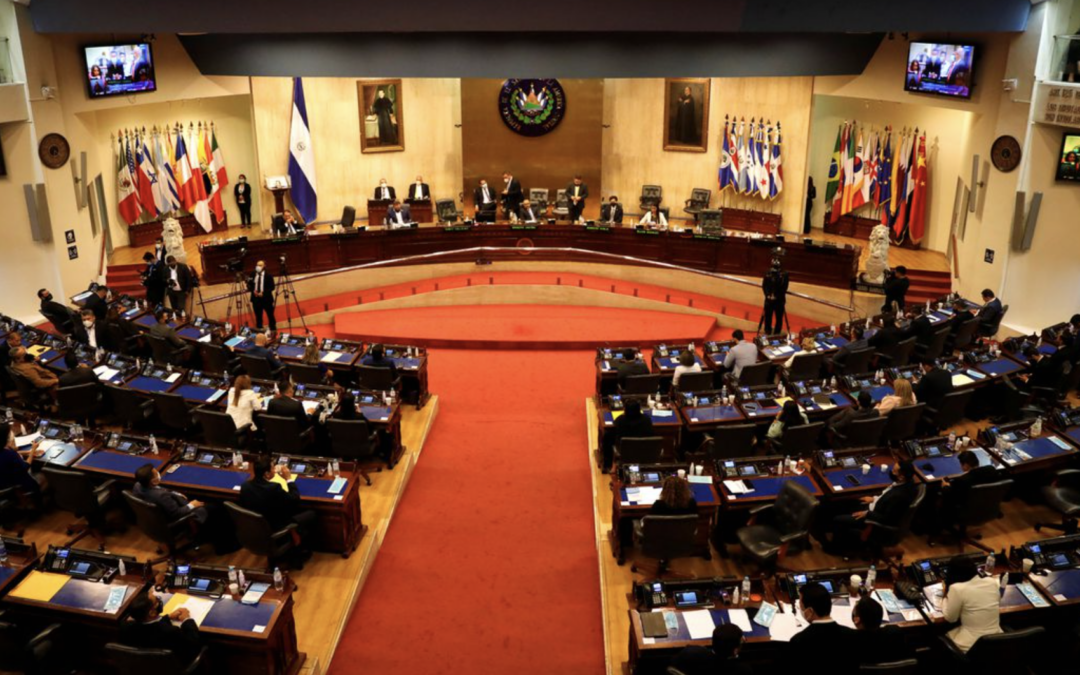
May 5, 2021 | News
The ICJ today condemned the dismissal of all five of the justices serving in El Salvador’s Supreme Court Constitutional Chamber by the country’s newly elected Legislative Assembly, backed by El Salvador’s President Nayib Bukele.
The dismissal on 2 May was justified on vague allegations of arbitrariness and dereliction of functions particularly relating to judicial decisions taken striking down government action related to the COVID-19 Pandemic. The Legislative Assembly also dismissed El Salvador’s Attorney General.
The ICJ stressed that the dismissal violated core tenets of the independence of the judiciary, by which judges are subject to dismissal only “for reasons of incapacity or behaviour that renders them unfit to discharge their duties.” (United Nations Basic Principles on the Independence of the Judiciary). Any decision must also be subject to a fair hearing of individual judges, with full due process guarantees.
The dismissal process was carried out without any individualized hearings, and without a clear expression of a legitimate basis for the dismissal.
The ICJ is concerned that this summary dismissal will undermine the independence of the judiciary, including by intimidating other judicial authorities in the country.
The dismissal of judges and the Attorney General was followed by the immediate appointment and swearing in office of other judges in replacement. This decision violates the procedural rules of selection and appointment, which are essential to safeguard the independence and impartiality of the judges serving in the Constitutional Chamber.
The decision to dismiss the judges was taken by a qualified majority of legislators, shortly after the new legislative assembly started its functions, in a swift procedure that lasted just a few hours.
The ICJ urges the government of El Salvador to restore respect to fundamental rule of law principles to prevent the arbitrary use of power and impunity.
The country is particularly vulnerable to impunity for human rights violations, where an independent judiciary is not in place to assess the lawfulness of government actions.
The ICJ calls on the responsible authorities of the Inter-American Commission for human rights and the United Nations human rights system to address the situation as a matter of priority.
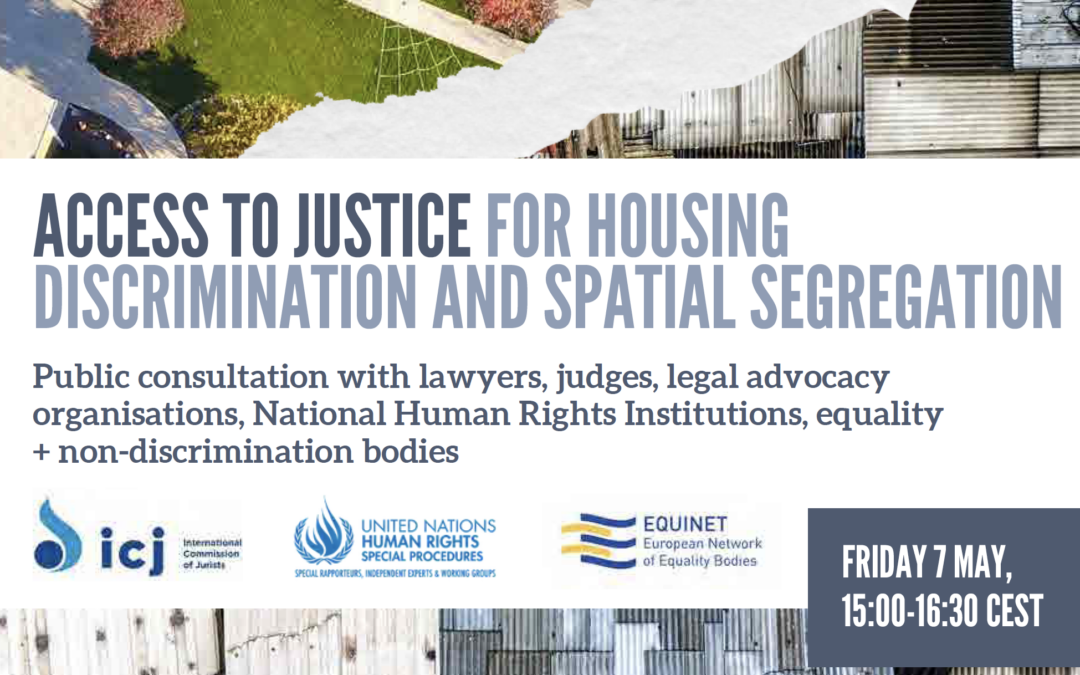
May 5, 2021 | Agendas, Events, News
On 7 May, the ICJ will hold a public consultation, together with the UN Office of the High Commissioner of Human Rights and Equinet on Access to Justice for Housing Discrimination and Spacial Segregation.
Featured speakers include Special Rapporteur on the right to housing Balakrishnan Rajagopal; retired Justice Zak Yacoob of the South African Constitutional Court; Supreme Court of India Advocate Vrinda Grover; and Equinet human rights defender Valérie Fontaine
More info here.









